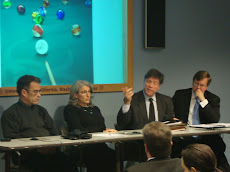An
estimated 30-60 lives may have been saved in Sweden due to use of Pandemrix, but more than 200 Swedish
children developed narcolepsy due to the Pandemrix vaccine.
So
now Pandemrix,
with the ASO3 adjuvant, won't be used in children.
But
the more important issue imho is why will it continue to be used in adults?
GSK’s Pandemrix was not a better vaccine for swine flu than the US
version, which did not contain the ASO3 adjuvant.
The
vaccine caused a lot more harm than any benefit it provided. We still
don't know the mechanism, but we can assume it was autoimmune. What other
problems might it cause when it is used with different antigens, in a
population exposed to different viruses?
This
is the first time narcolepsy was induced by a vaccine. The worst-affected
group was children. When vaccines cause Guillain-Barre, often the
worst-affected group is adults. What diseases might ASO3 cause next?
Why assume they will only be in teens?
We
still lack a complete picture of what other problems may possibly be linked to
Pandemrix. We know about
narcolepsy because the relative risk of this severe, rare disorder was 7-13 –
in other words, vaccinated kids were 7-13 times as likely to come down it after
vaccination, compared to the unvaccinated.
The
problem is, we know nothing about conditions that may be vaccine-related but
which don’t occur at such an astonishingly high rate.
Reuters has written a detailed article on the narcolepsy-Pandemrix flu vaccine link. This is a very important piece, and I advise you read the entire article here .
STOCKHOLM (Reuters) - Emelie Olsson is plagued by hallucinations and nightmares. When she wakes up, she's often paralyzed, unable to breathe properly or call for help. During the day she can barely stay awake, and often misses school or having fun with friends. She is only 14, but at times she has wondered if her life is worth living.
Emelie is one of around 800 children in Sweden and elsewhere in Europe who developed narcolepsy, an incurable sleep disorder, after being immunized with the Pandemrix H1N1 swine flu vaccine made by British drugmaker GlaxoSmithKline in 2009.
Finland, Norway, Ireland and France have seen spikes in narcolepsy cases, too, and people familiar with the results of a soon-to-be-published study in Britain have told Reuters it will show a similar pattern in children there.
Their fate, coping with an illness that all but destroys normal life, is developing into what the health official who coordinated Sweden's vaccination campaign calls a "medical tragedy" that will demand rising scientific and medical attention.
Europe's drugs regulator has ruled Pandemrix should no longer be used in people aged under 20. The chief medical officer at GSK's vaccines division, Norman Begg, says his firm views the issue extremely seriously and is "absolutely committed to getting to the bottom of this", but adds there is not yet enough data or evidence to suggest a causal link.
Others - including Emmanuel Mignot, one of the world's leading experts on narcolepsy, who is being funded by GSK to investigate further - agree more research is needed but say the evidence is already clearly pointing in one direction.
"There's no doubt in my mind whatsoever that Pandemrix increased the occurrence of narcolepsy onset in children in some countries - and probably in most countries," says Mignot, a specialist in the sleep disorder at Stanford University in the United States.
30 MILLION RECEIVED PANDEMRIX
In total, the GSK shot was given to more than 30 million people in 47 countries during the 2009-2010 H1N1 swine flu pandemic. Because it contains an adjuvant, or booster, it was not used in the United States because drug regulators there are wary of adjuvanted vaccines...
WAS IT WORTH IT?
In his glass-topped office building overlooking the Maria Magdalena church in Stockholm, Goran Stiernstedt, a doctor turned public health official, has spent many difficult hours going over what happened in his country during the swine flu pandemic, wondering if things should have been different.
"The big question is was it worth it? And retrospectively I have to say it was not," he told Reuters in an interview.
Being a wealthy country, Sweden was at the front of the queue for pandemic vaccines. It got Pandemrix from GSK almost as soon as it was available, and a nationwide campaign got uptake of the vaccine to 59 percent, meaning around 5 million people got the shot.
Stiernstedt, director for health and social care at the Swedish Association of Local Authorities and Regions, helped coordinate the vaccination campaign across Sweden's 21 regions.
The World Health Organisation (WHO) says the 2009-2010 pandemic killed 18,500 people, although a study last year said that total might be up to 15 times higher.
While estimates vary, Stiernstedt says Sweden's mass vaccination saved between 30 and 60 people from swine flu death. Yet since the pandemic ended, more than 200 cases of narcolepsy have been reported in Sweden.
With hindsight, this risk-benefit balance is unacceptable. "This is a medical tragedy," he said. "Hundreds of young people have had their lives almost destroyed."










No comments:
Post a Comment